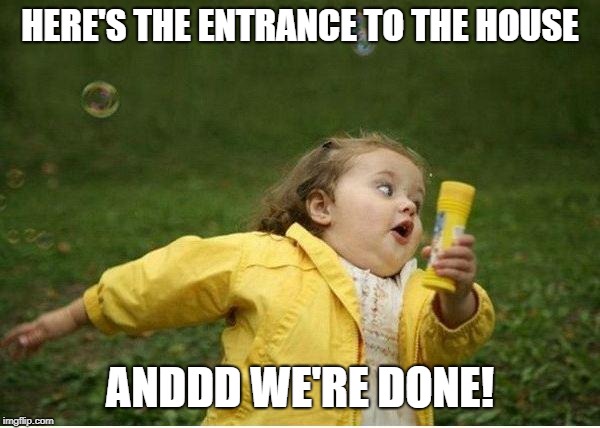Renting a place to temporarily call home isn’t a problem, but it does become a problem when you’re on the receiving end of a rental scam!
It doesn’t matter if it’s just one person renting out a basic room or a whole agency renting out hundreds of homes, the end game is always to make more (dirty) money.
While there are still good people who make their profits through hard work and ethical ways, you’ll hear of the occasional horror story.
Nobody is spared from the con game – from working professionals and young couples, to students with their parents.
We’ve decided to round up a list of the 7 most common things to look out for before agreeing to rent a place.
1) The Rent Is Too Good To Be True
This goes without saying: if something is too good to be true, it usually is. Whether it’s a person or an advertisement, it doesn’t hurt to be extra cautious.
If you see a notice for a room or unit that has a price way below the regular market rate, wait!
It could just be a lure. When you call to enquire, suddenly that room/unit is no longer available but there’s another that’s just the same – except a lot more expensive.
Use good referral points (like below) to get a rough idea of what the going market rate is like:
- Real estate agencies: Speaking to agents at a reputable company is free of charge, and the prices that they tell you will usually be accurate as they’re drawing on years of experience and their own database.
- Online website portals: There are several websites which provide a platform allowing users to buy or rent their properties (for example, PropertyGuru.com!). You can use these as a benchmark to look up how much other people are listing their rental unit for.
- Personal surveillance: Straightforward enough, this method involves you going to the neighbourhood of your choice and just asking around to try and get a rough estimate of how much the properties are being rented out for.
2) A Limited Selection Of Photos
A genuine landlord knows that a large number of clear and good quality photos will help them to rent out their place faster since potential tenants will be looking closely at them before deciding.
So, if you come across an ad that only has one or two photos; very blurry images that show almost nothing; or all the photos are of the exterior only, those should be clear warning signs.
Basically, don’t even bother making a call to see the place, if the ad itself looks shady.
High chances that the room/unit is actually in a terrible condition, or the person who posted the ad stole the details and used fake images – they’re just out to get your deposit!
3) Landlord/owner Seems To Be Missing In Action
By making sure that you take the time and effort to find out who the owner or landlord is, you’re already reducing the possibility of getting scammed by someone pretending to be the one in charge.
PropertyGuru Tip
You can check for the owner by verifying via the management office (if there’s one), or from the land title.
You’re allowed to ask (nicely!) to look at the title and confirm that the name and identification on the title correspond to that of the person you’re dealing with and paying the deposit to.
Don’t buy into the excuse that you’re not able to contact the owner/landlord because the person is away overseas or is too busy.
Case in point is this smooth scammer who pretended that the owner is his aunt living abroad while he helps to care for her house.
After he took deposits worth thousands of Ringgits from a few victims, he disappeared and left them suddenly without a roof over their heads.
Check out properties for rent
4) Check For The Person’s Employment
If you’d like an extra form of protection for yourself before you commit to anything, you can also opt to verify the person’s place of employment.
Politely insist on a name card then call up the workplace to check if he/she really is working there.
Better yet is if you check the company’s name via the Companies Commission of Malaysia (SSM), to make sure it’s a legitimate business that still exists.
With identity cards so easily forged nowadays, you can never be too careful with this extra step. If the person you’re dealing with does turn out to be scammer, you’d at least know where to find him/her.
5) Too Many Things Need Repairs
If you’re taking a walk through the unit to get a feel of the place before you sign the agreement, good for you!
This is a must-do, so that you’re aware of what sort of conditions you’ll be living in for the next few years.
Small repairs such as a faulty window or a microwave door that can’t close properly are all easily fixed.
However, if you see signs of neglect and too many items are broken down, move on. You wouldn’t want to be burdened with unnecessary repairs once you move in.
Here are some things you need to take note of as you tour the property:
- Air-conditioning units, air ventilation, and fans – Excessive dirt, damage, and poor insulation will cause you more in electricity bills.
- Interior paint and plumbing – Mould and water damage are a sure sign that there’s water leakage which will cost you more in water bills.
6) Your Unit Inspection Seems Rushed
If you have a landlord or a real estate agent who’s rushing you through the tour of the property or can only let you see it during certain times of the day, then it’s okay for you to get suspicious.
There could be some form of deceit taking place: the neighbourhood is noisy and dangerous when night falls or the noise from vehicles could be terrible during peak hours (knowing how Malaysia’s traffic jams are like).
Worse is if there are other tenants from Hell living in the same house as you, who could make you regret moving in for the entire term of your lease!
7) You’re Asked To Sign An Incomplete Document
We smell something fishy with this one, especially if the person you’re dealing with tries to convince you that certain items will be filled in later.
You see, when you blindly sign a lease, your signature means that you’ve agreed to whatever is on it.
But what if the person you dealt with is out to scam your money and breaks his/her promise to give you a discount, free utilities, and refundable deposit?
Read the entire lease and ask a lawyer (or search online) if there are legal jargon you’re uncertain of.
The last thing you’d want is to transfer a large amount of money to someone, only to find out that you need to fork out more for broken promises!
Only YOU Can Save Yourself From Getting Scammed!
We know that these are just a few things you can take note of to try and be on the safe side.
But while you can do your best to be on the look-out, there are too many factors that we aren’t able to cover.
That’s why, above all, make sure you know what you’re signing up for before you put your initials down on the dotted line.
It’s also very important for you to do your homework – and by that, we mean plenty of research!
Get yourself familiar with the surroundings of the place you’re interested in, whether it’s the reputation of the neighbourhood or the amenities and the people who inhabit the other units.
Before you make your decision, know your rights and responsibilities as a tenant to protect yourself from unnecessary conflicts.
You should at least have a rough idea by now of whether it’s conducive for you to put down roots for the next few years, good luck!
Disclaimer: The information is provided for general information only. PropertyGuru International (Malaysia) Sdn Bhd makes no representations or warranties in relation to the information, including but not limited to any representation or warranty as to the fitness for any particular purpose of the information to the fullest extent permitted by law. While every effort has been made to ensure that the information provided in this article is accurate, reliable, and complete as of the time of writing, the information provided in this article should not be relied upon to make any financial, investment, real estate or legal decisions. Additionally, the information should not substitute advice from a trained professional who can take into account your personal facts and circumstances, and we accept no liability if you use the information to form decisions.









